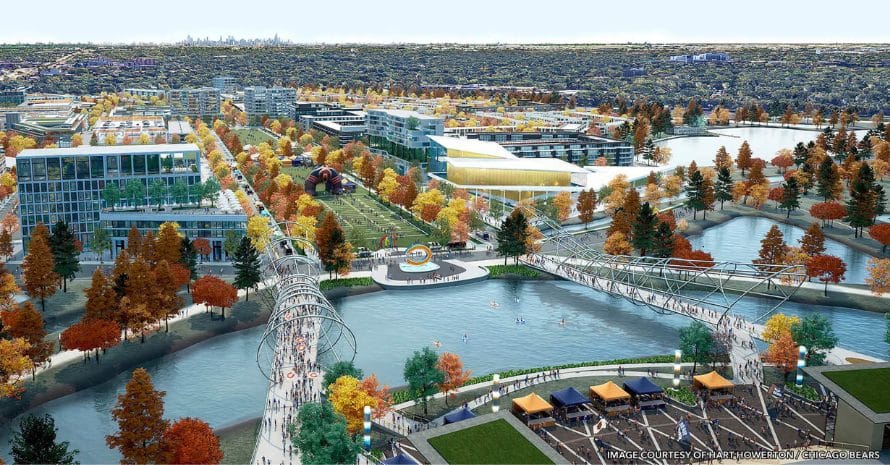ROOM FOR A VIEW: A rendering shows the view from the proposed Chicago Bears stadium overlooking a mixed-use district at Arlington Park. The Bears have expanded their reach for potential stadium sites. (chicagobears.com)
With mixed use piece, it’s critical to get right deal
The Chicago Bears are making the smart move to consider all their options for building a new NFL stadium apart from their preferred site at Arlington Park, according to two industry professionals, including a former Bears executive.
Last Friday, Bears President Kevin Warren and Scott Wehrli, the mayor of Naperville, a western suburb of Chicago, confirmed they had discussed building a stadium in that community after the team objected to recent tax hikes at Arlington Park, the shuttered horse racing facility acquired by the Bears for about $200 million in February.
The Bears are now spending additional dollars for initial demolition of the 326-acre property, which the team envisions as a sports and entertainment district open year round, extending to a sportsbook, performance venue, Bears hall of fame, a hotel, “tailgating green” and three neighborhood parks.
In that respect, it would be similar to SoFi Stadium and Hollywood Park in Inglewood, California, but with the Bears as the sole NFL tenant compared with the Los Angeles Rams and Chargers sharing a facility.
“The more options, the better for the Bears,” said Dave Greeley, a principal with Team Orbis in Austin, Texas, an investment advisory firm, and former chief marketing officer for the Bears from 2000-06, spanning the $600 million reconstruction of Soldier Field.
“It might not even be leverage,” Greeley said. “When they bought the Arlington Park site, I’m sure they’re thinking, ‘we’ll build here or flip it.’ It would be a great stadium location, but it’s just one factor among several when they’re doing these deals.”
The tax assessment for the racetrack, which is part of Cook County, raised the value of Arlington Park from $33.5 million to $197 million, would would increase the annual property tax bill from $2.8 million to $16.2 million, the Daily Herald reported. The Bears are appealing the assessment for what could potentially be a $5 billion overall development, the media outlet said.
“The stadium-based project remains broadly popular in Arlington Heights, Chicagoland and the site,” read a team statement issued by Bears spokesman Scott Hagel. “However, the property’s original assessment at five times the 2021 tax value … fails to reflect the property is not operational and not commercially viable in its current state.”

MR. PRESIDENT: Kevin Warren, hired as new president of the Chicago Bears in January, is point man for the NFL team’s effort to build a new stadium. (Getty Images)
The Bears are certainly not the first big league team to expand their reach to multiple sites to get the best deal possible for their investment. Over the past 20 years, as the scope of sports development is increasingly tied to mixed use, the stadium piece becomes part of a much bigger real estate play to create 24/7 revenue streams beyond NFL game days.
“These things are now so valuable between the team and the stadium and the mixed-use developments, that they really have to get it done right, so looking at other options is not a shock to me,” said Mitchell Ziets, CEO at Tipping Point Sports and a consultant who works with teams and municipalities to help finance arenas and stadiums.
Ziets’ current clients include the NFL’s Tennessee Titans and Jacksonville Jaguars as those teams develop a new $2.1 billion stadium in Nashville and a major renovation in north Florida that could reach $1 billion. (On Wednesday, the Jaguars are scheduled to release conceptual designs for their Stadium of the Future).
“I’m not close enough to know what the Bears are thinking, but you don’t need 326 acres,” Ziets said. “It’s just one team, so everything is different (compared with SoFi Stadium). The Titans are working on developing 110 acres with the parking lot and stadium site. Three-hundred plus acres is a lot of development and that means a lot of equity you have to put into the project, so giving up that site is not a big deal to me.”
Naperville, by comparison, is part of DuPage County, which has about 940,000 residents. On its own, Naperville-Aurora population tops 330,000, which stands among the state of Illinois’ largest communities outside of Chicago. Considering the current tax situation at Arlington Park, the Bears could potentially strike a stadium deal with Naperville to avoid paying millions of dollars in property taxes every year.
No potential stadium sites in Naperville have been publicly disclosed, but one location is reported to be the old BP campus property near Interstate 88, which connects Naperville to Chicago, about a 35-mile drive.
“The NFL is a different animal,” Greeley said. “If you’re going to build a huge stadium development in Inglewood, you can build one anywhere, within reason.”
He said, “Right now, the Bears would own a stadium on private land with a significant property tax liability, unlike a lot of stadiums. The Dallas Cowboys are one example. It’s on city of Arlington land and the city owns the stadium, but the Cowboys paid for (most) of it and run it.”
Before he formed Team Orbis in 2020, Greeley served eight years as president of Twin Oak Ventures, parent company of Austin FC. The Major League Soccer expansion team debuted at Q2 Stadium, a $260 million facility that opened in 2021.
“That’s consistent with the deal we struck with Austin FC,” Greeley said. “The team 100% paid for the stadium, but it’s on city-owned land and what that enables you to do is avoid property taxes in a property tax expensive state like Texas and Illinois. It’s legal and fair game.”
EDITOR’S NOTE: This story has been updated.







